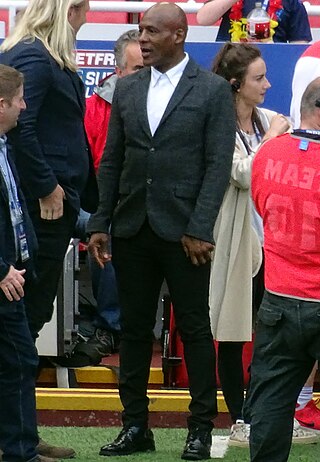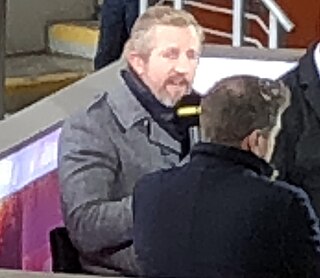Related Research Articles

Cuthwyn Ellery Hanley MBE is an English former rugby league player and coach. Over a nineteen-year professional career (1978–1997), he played for Bradford Northern, Wigan, Balmain, Western Suburbs and Leeds. He won 36 caps for Great Britain, captaining the team from 1988 to 1992, and 2 for England. Nicknamed 'Mr Magic' and 'The Black Pearl', he played most often as a stand-off or loose forward after starting out as a centre or wing.

Martin Nwokocha Offiah MBE ; born 29 December 1965) is an English former professional rugby league and rugby union footballer who played in the 1980s, 1990s and 2000s. Offiah was inducted into the Rugby League Hall of Fame in 2013. He scored over 500 tries during his rugby league career, making him the third-highest try scorer of all time, and now features in a statue of great rugby league players outside Wembley Stadium.

Jim Sullivan was a Welsh rugby league player, and coach. Sullivan joined Wigan in June 1921 after starting his career in rugby union. A right-footed toe-end style goal-kicking fullback, he scored 4,883 points in a career that spanned 25 years with Wigan, and still holds several records with the club today.

Denis Charles Betts is an English rugby league coach and former player. He is the head-coach of Wigan Warriors Women and a former assistant coach of the England national team.
Gary John Connolly is a former professional rugby league footballer who played in the 1980s, 1990s and 2000s as a fullback and centre for St Helens, Canterbury Bulldogs, Wigan Warriors, Leeds Rhinos and for the Great Britain national side. He also played rugby union for Harlequins, Orrell and Irish side Munster.
Eric Hughes is a retired English rugby union and professional rugby league footballer who played in the 1960s, 1970s and 1980s, and coached rugby league in the 1980s and 1990s. He played representative level rugby union (RU) for England (Under-15s), and representative level rugby league (RL) for Great Britain and England, and at club level for Widnes, Canterbury-Bankstown Bulldogs, St Helens and the Rochdale Hornets, as a wing, centre or stand-off, and coached at club level for Widnes, Rochdale Hornets, St Helens, Leigh and Wigan Warriors. He unwittingly added confusion to the Canterbury-Bankstown Bulldogs team as he was unrelated but played at the same time as the three Australian brothers named Hughes; Garry, Graeme and Mark.
Charles Douglas Laughton is an English former professional rugby league footballer who played in the 1960s, 1970s and 1980s, and coached in the 1970s, 1980s and 1990s. He played at representative level for Great Britain (captain), winning 15 caps in all, winning a further cap for England, and Lancashire, and at club level for St. Helens, Wigan, Widnes, and Canterbury-Bankstown, as a second-row, or loose forward, and coached at club level for Widnes and Leeds.

Andrew Gregory is an English former professional rugby league footballer. A Great Britain international representative scrum-half, he is an inductee of the Wigan Hall of Fame. He was the first player to win five Challenge Cup Final winners medals, first player to play in eight Challenge Cup finals and one of only two players to have played in six Ashes series against Australia, the other being Garry Schofield.
Kevin Leslie Iro, also known by the nickname of '"The Beast", is a former professional rugby league footballer who played in the 1980s, 1990s and 2000s, and coached in the 2000s. He played at representative level for New Zealand, Cook Islands, Auckland and Rest of the World, and at club level for Mount Albert, Manly-Warringah, Hunter Mariners and the Auckland Warriors, and in England for Wigan, Leeds and St. Helens, as a wing, centre or stand-off, playing in Challenge Cup finals for all three English teams, and coached at representative level for Cook Islands.
Jim "Big Jim" Mills is a Welsh former rugby union, and professional rugby league footballer who played in the 1960s, 1970s and 1980s. A Wales and Great Britain international representative prop, "Big Jim" as he was known, played club rugby in England with Halifax, Salford, Bradford Northern, Widnes and Workington Town, and also in Australia for North Sydney. He is the father of former Widnes forward David Mills.
David Myers was an English professional rugby league footballer who played in the 1980s and 1990s. He played as a reserve at representative level for Great Britain in non-Test matches on the 1992 tour of Papua New Guinea, Australia, and New Zealand, and at club level for Widnes, Warrington, Wigan, Manly-Warringah Sea Eagles, Bradford Bulls, Western Suburbs Magpies and Salford City Reds, as a wing.
Kurt John Sorensen is a New Zealand former professional rugby league footballer who played in the 1970s, 1980s and 1990s.
Brian "Mad Dog" Juliff is a Welsh former rugby union and professional rugby league footballer who played in the 1970s and 1980s. He played representative level rugby union (RU) for Wales 'B', Wales President's XV, East Wales, Glamorgan County RFC, at invitational level for Crawshays RFC, and at club level Mountain Ash RFC, Newport RFC and Pontypridd RFC, as a Left-Wing, or Outside-Centre, i.e. number 11, or 13, and representative rugby league (RL) for Wales, and at club level for Widnes, Wakefield Trinity, Wigan, Halifax and Castleford, as a wing, second-row, loose forward, i.e. number 2 or 5, 11 or 12, or 13, during the era of contested scrums. In June 2012 Juliff was appointed as the chairman of Wales Rugby League.
A. Edward Toohey was an English professional rugby league footballer who played in the 1940s, 1950s and 1960s, and coached in the 1970s. He played at representative level for Great Britain and England, and at club level for Wigan, Barrow, Leigh and Liverpool City, as a centre or scrum-half, and coached at club level for Wigan.
Raymond "Ray" F. Dutton is an English former professional rugby league footballer who played in the 1960s, 1970s and 1980s, and coached in the 1970s and 1980s. He played at representative level for Great Britain and England, and at club level for Runcorn ARLFC, Widnes Rovers ARLFC, Widnes and Whitehaven, as a right-footed toe-end style goal-kicking fullback, i.e. number 1, and coached at club level for Whitehaven and Widnes Tigers ARLFC.
Stuart Wright is an English former professional rugby league footballer who played in the 1960s, 1970s and 1980s. He played at representative level for Great Britain, England and Lancashire, and at club level for Wigan and Widnes, as a wing.
John Basnett is an English rugby union, and professional rugby league footballer who played in the 1980s. He played club level rugby union (RU) for New Brighton F.C., Winnington Park and for Cheshire in the RFU County Championship competition and representative level rugby league (RL) for Great Britain, and at club level for Widnes, as a wing.
Steve O'Neill is an English former professional rugby league footballer who played in the 1970s, 1980s and 1990s, and coached in the 1990s and 2000s. He played at representative level for England, and at club level for Wigan, Widnes, Salford, and Swinton as a prop or second-row, and coached at representative level for Ireland.
Malcolm Aspey is an English former professional rugby league footballer who played in the 1960s, 1970s and 1980s, and coached in the 1980s. He played at club level for Fulham RLFC, Wigan, and Salford, as a centre, and coached at club level for Salford.
Ged Byrne is a former professional rugby league footballer who played in the 1980s and 1990s. He played at club level for Salford, Wigan, Wakefield Trinity, Oldham and Workington Town, as a wing, centre, or stand-off.
References
- ↑ "Statistics at rugbyleagueproject.org". rugbyleagueproject.org. 31 December 2017. Retrieved 1 January 2018.
- ↑ "Coach Statistics at rugbyleagueproject.org". rugbyleagueproject.org. 31 December 2017. Retrieved 1 January 2018.
- ↑ "Player Summary: Joe Lydon". Rugby League Records. Rugby League Record Keepers Club. Retrieved 16 January 2024.
- ↑ "35945246-The Wigan Schoolboys Under 11s team". National World. Retrieved 16 January 2024.
- ↑ "Work in progress is the making of Lydon". The Independent. 14 November 2004.
- ↑ "Joe Lydon". rugby.widnes.tv. Retrieved 16 January 2024.
- ↑ "Challenge Cup in 1984: Joe Lydon scores two tries at Wembley". BBC Sport. 12 July 2013. Retrieved 15 January 2024.
- ↑ "Measuring Worth – Relative Value of UK Pounds". Measuring Worth. 31 December 2014. Retrieved 1 January 2015.
- ↑ "Wigan V Manly rugby league world club" – via www.youtube.com.
- ↑ "Longest drop kick, Rugby League". Guinness World Records. Retrieved 15 January 2024.
- ↑ Fitzpatrick, Paul (13 May 1988). "Tour pair banned" . The Guardian. London. p. 20 – via ProQuest.
- ↑ "Lydon handed development role at the RFU". ESPN. 7 September 2000. Retrieved 16 January 2024.
- ↑ Rugby Football Union – Joe Lydon Interview Archived 8 November 2006 at the Wayback Machine
- ↑ Ackford, Paul (6 June 2004). "Lydon warms to task of getting England backs up and running". The Daily Telegraph. London. Retrieved 1 January 2012.
- ↑ "Lydon turns down academy position". BBC News. 26 May 2006. Retrieved 1 January 2012.
- ↑ "Joe Lydon – Wembley". Quins. 24 August 2007. Archived from the original on 30 September 2007. Retrieved 25 August 2007.
- ↑ "Lydon named WRU's rugby overseer". BBC Sport. 19 November 2008. Retrieved 15 January 2024.
- ↑ "Joe Lydon leaves Wales role for new job with England". BBC Sport. 24 May 2013. Retrieved 15 January 2024.
- ↑ "Joe Lydon steps down from England player development role". Belfast Telegraph. 16 March 2016. Retrieved 15 January 2024.
- ↑ "Joe Lydon: Player development is a fascination for me". Irish Times. 13 May 2017. Retrieved 15 January 2024.
- ↑ "Superstars roll of honour". BBC. 5 November 2004. Retrieved 1 January 2012.